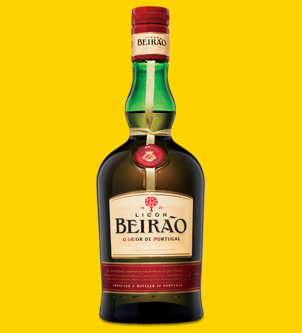
A liqueur is an alcoholic drink composed of spirits and additional flavorings such as sugar, fruits, herbs, and spices. Often served with or after dessert, they are typically heavily sweetened and un-aged, beyond a resting period during production, when necessary, for their flavors to mingle.

Mojito is a traditional Cuban punch. The cocktail often consists of five ingredients: white rum, sugar, lime juice, soda water, and mint. Its combination of sweetness, citrus, and herbaceous mint flavors is intended to complement the rum, and has made the mojito a popular summer drink.

Caipirinha is a Brazilian cocktail, of São Paulo origin, with cachaça, sugar, lime, and ice. The drink is prepared by mixing the fruit and the sugar together, then adding the liquor.

The daiquiri is a cocktail whose main ingredients are rum, citrus juice, and sugar or other sweetener.
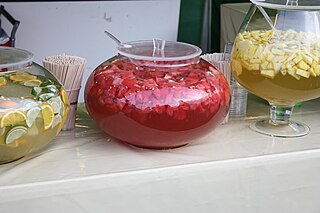
The term punch refers to a wide assortment of drinks, both non-alcoholic and alcoholic, generally containing fruits or fruit juice. The drink was introduced from the Indian subcontinent to England by employees of the East India Company in the late 17th century. Punch is usually served at parties in large, wide bowls, known as punch bowls.

A bartender is a person who formulates and serves alcoholic or soft drink beverages behind the bar, usually in a licensed establishment as well as in restaurants and nightclubs, but also occasionally at private parties. Bartenders also usually maintain the supplies and inventory for the bar. As well as serving beer and wine, a bartender can generally also mix classic cocktails such as a Cosmopolitan, Manhattan, Old Fashioned, and Negroni.
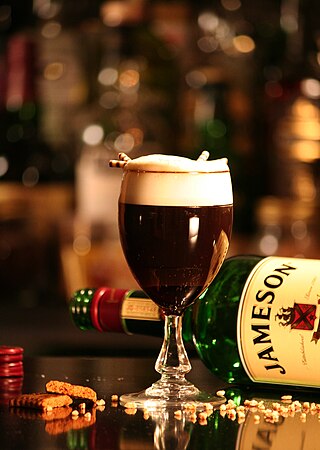
A liqueur coffee is a caffeinated alcoholic drink that consists of a shot of liqueur, mixed with coffee. It is typically served in a liqueur glass, often accompanied with cream and sugar. Coffee liqueur beverages are served in different fashions and can be found throughout many countries. One of the most popular liqueur coffee beverage is commonly known as Irish coffee. Liqueur coffee beverages are largely classified as cocktails as well as digestifs which are aimed at aiding the digestive process typically after a meal.

Mekhong (แม่โขง) is Thailand's first domestically produced branded golden spirit. It is also known as "The Spirit of Thailand".

A Bellini is a cocktail made with Prosecco and peach purée or nectar. It originated in Venice, Italy.

A flaming drink is a cocktail or other mixed drink that contains flammable, high-proof alcohol, which is ignited before consumption. The alcohol may be an integral part of the drink, or it may be floated as a thin layer across the top of the drink. The flames are mostly for dramatic flair. However, in combination with certain ingredients, the flavor of the drink is altered. Some flavors are enhanced, and the process may impart a toasted flavor to some drinks.

The Pimm's cup is a cocktail that is popular in England, in the United Kingdom. It is one of numerous fruit cups, a type of cocktail with gin, a soft drink, and fruit. Its primary spirit is Pimm's No. 1 Cup, a gin-based beverage flavoured with fruits and spices invented around 1823 as a health drink.
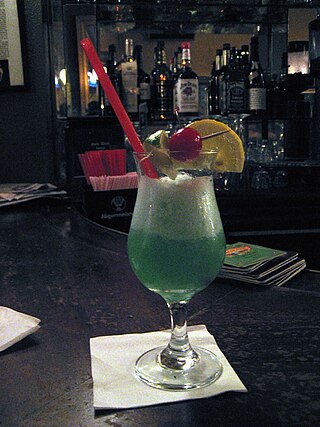
The Blue Hawaii is a tropical cocktail made of rum, pineapple juice, Blue Curaçao, sweet and sour mix, and sometimes vodka.

A Mitch Morgan is a cocktail that consists of a shot of bourbon whiskey served with a piece of fried bacon as a cocktail garnish and served in a glass coated on the inside with a thin veneer of bacon grease.

In terms of mixed drinks, shrub is the name of two different, but related, acidulated beverages. One type of shrub is a fruit liqueur that was popular in 17th and 18th century England, typically made with rum or brandy and mixed with sugar and the juice or rinds of citrus fruit.

A well drink or rail drink is an alcoholic beverage or mixed drink made using the lower-cost liquors stored within easy reach of the bartender in the bar's "speed rail", "speed rack", or "well", a rack or shelf at a lower level than the bar that the bartender uses to prepare drinks. In any given establishment, the rail/well liquors available may also be known as the "house pours", "house brands", "house spirits", "pour brands", or "proprietary spirits".
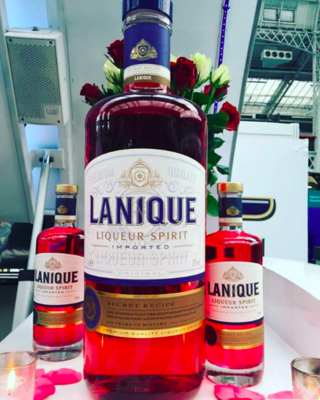
Lanique is a strong 39% spirit liqueur made with Attar of Rose that is created by steam distilling thousands of rose petals. Lanique is often used in classic cocktails to add a rose flavour to them or due to its high alcohol strength as a drink in its own right with tonic or lemonade. It is now produced in the UK and owned by a Jersey based company.

The suffering bastard is the name for two different mixed drinks, one being more of a standard cocktail associated with World War II and the other being more of an exotic drink associated with Tiki bars. As is the case with many cocktails, there are multiple recipe variations and historical origins have been argued and changed over time. Two of the earliest recipe versions have very different ingredients. One from bartender Joe Scialom (1942) calls for brandy and gin, while another from Tiki pioneer Victor J. Bergeron primarily uses rum along with "secret ingredients" and is known for being garnished with a cucumber.

The Queen's Park Swizzle is a classic rum cocktail that originated in Trinidad.


















